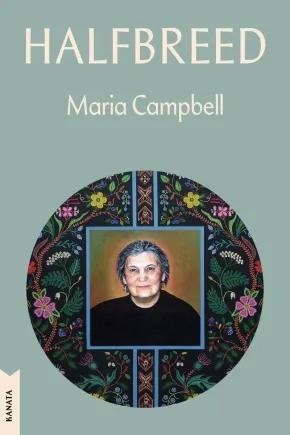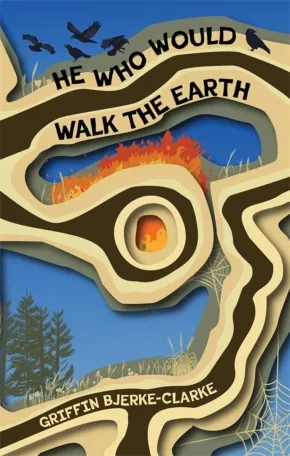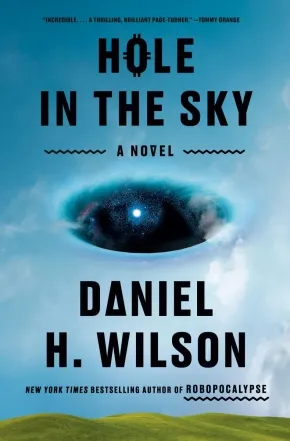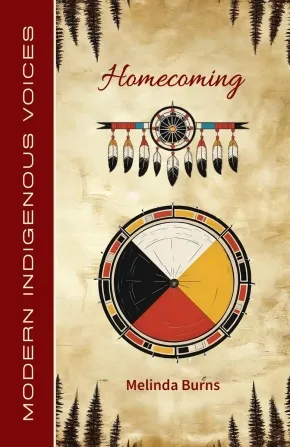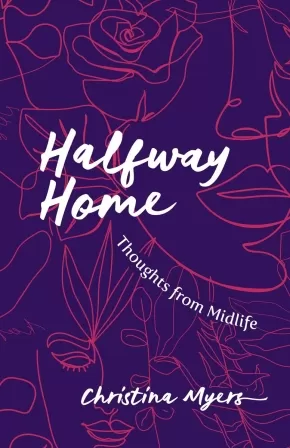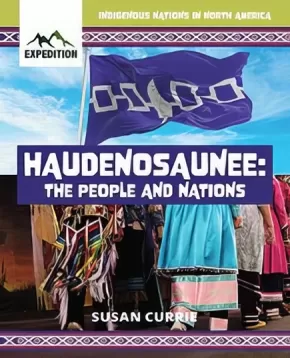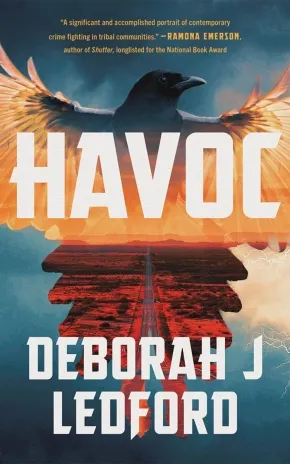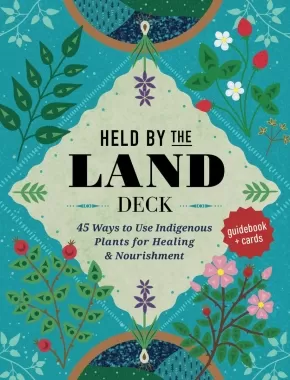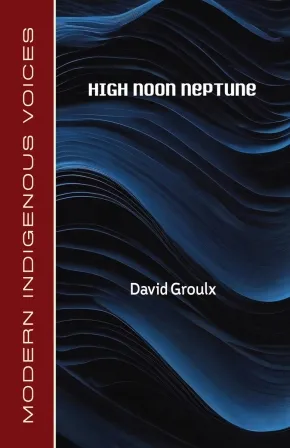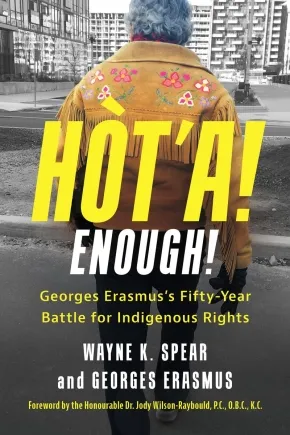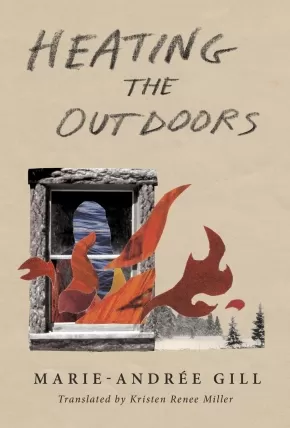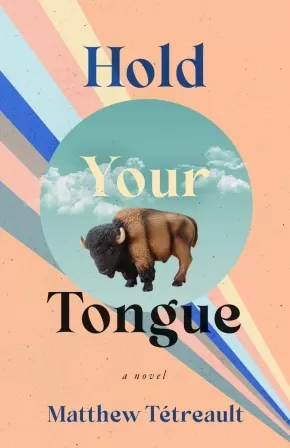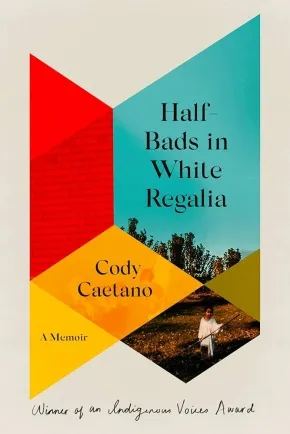Browse Books for Adults
Synopsis:
A new, fully restored edition of the essential Canadian classic.
An unflinchingly honest memoir of her experience as a Métis woman in Canada, Maria Campbell's Halfbreed depicts the realities that she endured and, above all, overcame. Maria was born in Northern Saskatchewan, her father the grandson of a Scottish businessman and Métis woman--a niece of Gabriel Dumont whose family fought alongside Riel and Dumont in the 1885 Rebellion; her mother the daughter of a Cree woman and French-American man. This extraordinary account, originally published in 1973, bravely explores the poverty, oppression, alcoholism, addiction, and tragedy Maria endured throughout her childhood and into her early adult life, underscored by living in the margins of a country pervaded by hatred, discrimination, and mistrust. Laced with spare moments of love and joy, this is a memoir of family ties and finding an identity in a heritage that is neither wholly Indigenous or Anglo; of strength and resilience; of indominatable spirit.
This edition of Halfbreed includes a new introduction written by Indigenous (Métis) scholar Dr. Kim Anderson detailing the extraordinary work that Maria has been doing since its original publication 46 years ago, and an afterword by the author looking at what has changed, and also what has not, for Indigenous people in Canada today. Restored are the recently discovered missing pages from the original text of this groundbreaking and significant work.
Educator & Series Information
This book is part of the Kanata Classics series, which celebrates timeless books that reflect the rich and diverse range of voices in Canadian literature.
Additional Information
224 pages | 5.50" x 8.23" | Paperback
Synopsis:
Felix walks alone through a decaying world until he is challenged to remember his past and build his future — an anti-colonial western exploring trauma, memory, and healing.
Felix Babimoosay is his most recent name, and it seems better than any other name he’s been offered. He journeys ever forward across a sharp landscape of flat plains, stung by insects, wind, and thirst. Unable to remember his past, he doggedly walks alone through the decaying world until he is pursued by a threatening man claiming a bounty on Felix’s head. Felix’s irritation spurs a slow memory of the days he left behind, until he stumbles into a corrupted town and a city of talking crows that push him to move beyond his lost memories.
Sparse and dreamy, Griffin Bjerke-Clarke’s debut novel explores memory, identity, trauma, and healing through a timeless journey. Métis storytelling methods and elements of horror infuse He Who Would Walk the Earth, an anti-colonial western that powerfully evokes a mood reminiscent of twentieth-century classics like Waiting for Godot. This book unsettles as much as it stokes, dystopian in Felix’s apathy yet optimistic in the way he addresses challenges along his listless way. In the end, Felix must learn from his earnest mistakes as he begins to understand that agency requires collaborating with those around him.
Reviews
“He Who Would Walk the Earth is an anti-imperialist adventure that explores the strange and beautiful gifts of becoming who we are-and how we exist-in our individual and collective power. Bjerke-Clarke deftly blends western and fantasy genres in this innovative debut novel where relationality shapes reality.” - Tiffany Morris
“A walker journeys through a dystopian and mythically violent fairytale, where time and space are elastic and other-than-humans are central, to learn the lesson shared with him that ‘it doesn’t have to be this way.’ Partly a condemnation of the terrible costs of war and capitalism, Griffin Bjerke-Clarke reminds us, despite it all, we need to have hope.” - Deanna Redder
Additional Information
160 pages | 5.50" x 8.50" | Paperback
Synopsis:
A Native American first contact story and gripping thriller from the New York Times bestselling author of Robopocalypse
"Thrilling and personal... an important addition to the landscape of science fiction."—Pierce Brown, #1 New York Times bestselling author of Red Rising
"Hole in the Sky is mind-bending… indigenous knowledge collides with science fiction in a thrilling page-turner."—Sterlin Harjo, filmmaker and writer of Reservation Dogs
On the Great Plains of Oklahoma, in the heart of the Cherokee Nation, a strange atmospheric disturbance is noticed by Jim Hardgray, a down-on-his-luck single father trying to reconnect with his teenage daughter, Tawny. At NASA’s headquarters in Houston, Texas, astrophysicist Dr. Mikayla Johnson observes an interaction with the Voyager 1 spacecraft on the far side of the solar system, and she concludes that something enormous and unidentified is heading directly for Earth. And in an undisclosed bunker somewhere in the United States, an American threat forecaster known only as the Man Downstairs intercepts a cryptic communication and sends a message directly to the president and highest-ranking military brass: “First contact imminent.”
Daniel H. Wilson’s Hole in the Sky is a riveting thriller in the most creative tradition of extraterrestrial fiction. Drawing on Wilson’s unique background as both a threat forecaster for the United States Air Force and a Cherokee Nation citizen, this propulsive novel asks probing questions about nonhuman intelligence, the Western mindset, and humans’ understanding of reality.
Reviews
“Incredible... Hole in the Sky is not only a thrilling, brilliant page-turner, its pages also turned me into the kind of reader I always want to be—deeply involved and curious about the world and the story unfolding before me, as if by magic—the kind of reader who can’t stop reading, who dreads the book coming to an end even while I can’t stop making my way toward it, who goes back and starts all over to figure out how it was done. Here we have a highly original premise about alien contact—no small feat unto itself—which also manages to seamlessly fold in Indigenous lives and knowledge. Every character here is alive, and there are so many stunning sentences I had to stop underlining. The story is killer. I love it. Run don’t walk to read this book.”—Tommy Orange, New York Times bestselling author of There There and Wandering Stars
“Hands down one of the best books I’ve read in a couple of years. Daniel H. Wilson has crafted a technotradish ride into the future in the most harrowing and engaging ways imaginable. Tightly tuned, sharply researched, and warm in all the best ways, you’ll want to clear your schedule because this is a sit-down-and-read-the-whole-thing-right-now kind of book. Bravo, Mr. Wilson!”—Theodore C. Van Alst Jr., bestselling co-editor of the Never Whistle At Night series
“This book doesn’t whisper. It roars from the edges of space, memory, and grief. Hole in the Sky is Indigenous sci-fi at its rawest: part cosmic threat, part broken father-daughter elegy, part fever dream of classified government failures. The humanity here is bruised, sharp-tongued, and holding on. And the fear? It’s in the blood. This one gets under your skin and stays there.”—Shane Hawk, bestselling co-editor of the Never Whistle at Night series
Additional Information
288 pages | 6.35" x 9.54" | Hardcover
Synopsis:
Homecoming is a poetry collection that reflects our human journey as we grow and learn, and author’s personal journey through childhood, marriage, divorce, parenthood, and parents’ old age, as well as the author’s quest to reclaim and celebrate her Native heritage. The poems in Homecoming are grouped according to the four directions of the Medicine Wheel: East for Beginnings, South for Innocence, West for Going Within, North for Elder and Wisdom, plus three poems for the Centre, the Great Mystery.
Educator & Series Information
This book is part of the Modern Indigenous Voices series.
Additional Information
88 pages | 5.50" x 8.50" | Paperback
Synopsis:
Award-winning author Christina Myers navigates the uncharted territory of midlife in a time of rapid social, cultural, and environmental change.
Modern midlife is finding oneself halfway home but without any reliable maps for the route ahead. With wit and warmth, these personal essays move from a first bra to first hot flashes to consider the lessons we learn through media and culture--and from each other--about bodies, sexuality, fatphobia, gender roles, and what we should want in life. Christina Myers explores the ways that beauty standards and cultural expectations around femininity have shaped our identities and how we might shed those going forward; the power of friendships and the value of having other women to learn from; the anxiety of moving through motherhood into menopause in a time of global environmental crisis and political upheaval; and the uncertainty of how this stage of life should unfold, as old systems shift and crumble. Though our maps for midlife are never identical, we discover familiar paths and common landmarks in each other's stories; these essays remind us there are others on this trail with us, just behind or just ahead, out of sight. We are not alone.
Reviews
"Reading Halfway Home feels like having a conversation with a very wise, witty friend. Christina Myers's delightful collection of essays about the stages of a woman's life is personal, but also universal. We've all been there, and it's a joy to realize that we're not alone on the journey." — Elizabeth Renzetti, author of Shrewed: A Wry and Closely Observed Look at the Lives of Women and Girls
"Christina Myers effortlessly charts the often-overlooked territory of being a woman in today's complex society. Through insightful personal essays, she explores the intricate intersections of femininity, friendship, motherhood, and environmental turbulence, all with a nostalgic flair. With much-needed humour and wisdom, Myers reminds us that even in the midst of uncertainty, we're never alone on this journey. This book is a necessary, heartfelt guide for those seeking their own unique path through the maze of midlife. A must read!" — Chelene Knight, award-winning author of Let It Go: Free Yourself from Old Beliefs and Find a New Path to Joy
"Halfway Home is a love letter to mothers and grandmothers, sisters and daughters, witches and crones. Christina Myers's storytelling is gentle and honest, a must-read memoir for women of all ages. So many times, I found myself nodding and exclaiming, 'Yes! That's exactly it!' It's a mirror but also an invitation to join a secret coven of wise women." — K. J. Aiello, author of The Monster and the Mirror: Mental Illness, Magic, and the Stories We Tell
Educator Information
Includes one chapter focusing on the author's Indigenous identity.
Additional Information
200 pages | 5.50" x 8.50" | Paperback
Synopsis:
The Haudenosaunee, like many Indigenous Nations and communities across North America, have their own history and culture. Discover the Peacemaker Story, which explains how the Confederacy was created. Learn about historical facts and their effects on present times. Get to know Haudenosaunee people who give thanks everyday and have many stories and traditions to tell.
Educator & Series Information
This book is part of the Indigenous Nations in North America series.
This book is included in the Indigenous Books for Schools database from the Association of Book Publishers of BC.
Additional Information
32 Pages | Paperback
Synopsis:
In this tightly paced sequel to Redemption, Eva “Lightning Dance” Duran joins the Taos Pueblo tribal police department to uncover a member of her community’s murder…and the conspiracy behind it.
It’s been over a year since the case that almost broke her, but when Eva “Lightning Dance” Duran is called back to duty, she doesn’t hesitate to answer. A bank robbery has left an officer down and a suspect on the run. Law enforcement is in hot pursuit, and residents are on the lookout—but before anyone can catch the criminal, tragedy strikes.
A member of the Taos Pueblo tribe has been shot and killed. The culprit? An untraceable 3D printed gun. With the support of fellow tribal cops, Eva breaks the news to the victim’s family and swears to find justice.
More violence follows, feeding the rising racial tensions between the Taos Pueblo people and the Hispanic community. New evidence forces Eva to consider the possibility that the bank robbery and 3D guns are related, but until she figures out how, there’s no telling how deep this crime ring goes…or how far its evasive ringleader will go to protect it.
Reviews
“Ledford’s sequel to Redemption excels…For fans of books by both Tony and Anne Hillerman, along with others that embody the spirit and landscape of the Southwest.” —Library Journal
“Atmospheric, poignant, and set in the Taos Pueblo, Ledford’s tribal police officer Eva ‘Lightning Dance’ Duran doesn’t flinch in this dark, twisting tale that’s riveting from the first page. A fantastic second book in this new series from a master of crime fiction.” —Jamie Freveletti, award-winning and internationally bestselling author of the Emma Caldridge series
Series Information
This book is part of the Eva "Lightning Dance" Duran series.
Additional Information
352 pages | 5.50" x 8.50" | Paperback
Synopsis:
Have Indigenous plant knowledge at your fingertips with this gorgeously illustrated card deck from Leigh Joseph, an ethnobotanist and a member of the Squamish Nation.
Plants can be a great source of healing as well as nourishment, and the practice of growing and harvesting from trees, flowering herbs, and other plants is a powerful way to become more connected to the land. The Indigenous Peoples of North America have long traditions of using native plants as medicine as well as for food. Held by the Land Deck includes 45 cards of indigenous plants and their properties and a 48-page booklet to guide you along the way. Here are some of the things you will find:
- Tips to build your own home apothecary
- Notes on how to mindfully harvest and connect to the land you’re on
- Recipes for infused oils and salves
- A botanical glossary to help out with some of the more technical language
- Checklists for safe and sustainable harvesting
This beautifully illustrated card deck includes plants that are culturally significant to the Pacific Northwest, including Western Red Cedar, Devil’s Club, Broad-Leaved Plantain, Camas, Wapato, and Red Laver. Special features in the booklet include recipes for food and beauty products along with stories and traditions around the plants.
This elegant, full-color card deck and booklet is your go-to guide for Indigenous plants and will give you new insights into the power of everyday nature.
Additional Information
48 pages | 4.50" x 5.90" | 45 Cards and 48-Page Booklet
Synopsis:
High Noon Neptune is a powerful poetry collection that delves into important issues of loss, love, class, and capitalism. Throughout this book, the reader is taken on a journey of survival, where the intersections of identity and oppression are explored with clarity and reverence. The poems shed light on the complexities of living in a society that is rife with discrimination and inequality, and the battles that individuals face to survive within these intersecting systems. This book fearlessly navigates through societal and personal struggles with a sharp wit and bold defiance. With each poem, David Groulx confronts and challenges the societal norms and structures that perpetuate injustice and inequality. High Noon Neptune offers a raw and unapologetic perspective on the realities of navigating life as a marginalized individual. This poetry collection is a powerful testament to the resilience and strength of those who refuse to be silenced and continue to fight for survival.
Educator & Series Information
This book is part of the Modern Indigenous Voices series.
Additional Information
88 pages | 5.50" x 8.50" | Paperback
Synopsis:
The political life of Dene leader Georges Erasmus - a radical Native rights crusader widely regarded as one of the most important Indigenous leaders of the past fifty years.
For decades, Georges Erasmus led the fight for Indigenous rights. From the Berger Inquiry to the Canadian constitutional talks to the Oka Crisis, Georges was a significant figure in Canada's political landscape. In the 1990s, he led the Royal Commission on Aboriginal Peoples and afterward was chair and president of the Aboriginal Healing Foundation, around the time that Canada's residential school system became an ongoing frontpage story.
Georges's five-decade battle for Indigenous rights took him around the world and saw him sitting across the table from prime ministers and premiers. In the 1980s, when Georges was the National Chief of the Assembly of First Nations, he was referred to as the "Thirteenth Premier." This book tells the personal story of his life as a leading Indigenous figure, taking the reader inside some of Canada's biggest crises and challenges.
Awards
- 2025 Indigenous Voices Awards - Prose in English Award
Additional Information
320 pages | 6.00" x 9.00" | 57 b&w illustrations | Paperback
Synopsis:
You're the clump of blackened spruce
that lights my gasoline-soaked heart
It's just impossible you won't be back
to quench yourself in my crème-soda
ancestral spirit
Irreverent and transcendent, lyrical and slang, Heating the Outdoors is an endlessly surprising new work from award-winning poet Marie-Andrée Gill.
In these micropoems, writing and love are acts of decolonial resilience. Rooted in Nitassinan, the territory and ancestral home of the Ilnu Nation, they echo the Ilnu oral tradition in Gill's interrogation and reclamation of the language, land, and interpersonal intimacies distorted by imperialism. They navigate her interior landscape—of heartbreak, humor, and, ultimately, unrelenting light—amidst the boreal geography.
Heating the Outdoors describes the yearnings for love, the domestic monotony of post-breakup malaise, and the awkward meeting of exes. As the lines between interior and exterior begin to blur, Gill's poems, here translated by Kristen Renee Miller, become a record of the daily rituals and ancient landscapes that inform her identity not only as a lover, then ex, but also as an Ilnu and Québécoise woman.
Awards
- 2020 Indigenous Voices Award for Best Published Poetry in French winner. This book is the translated version in English.
Reviews
"I'm literally captivated by the accuracy, the beauty. They taste of honey, these poems." —Karine Villeneuve, bookseller, Page par Page
"Heating the Outdoors is a stunning collection exploring heartbreak, and the awkward dance between exes from the positionality of an Ilnu and Québécoise woman whose poetic 'gasoline-soaked heart' yearns deeply for love. Translated by Kristen Renee Miller from French into English, Gill's Heating the Outdoors re-wilds the ritualistic humdrum of domestic life while honouring the land and her 'crème-soda ancestral spirit.'" —Shannon Webb-Campbell, author of Lunar Tides and I Am a Body of Land
"These poems live in a bachelor apartment over the corner store. They're on the bus looking out at the muddy hangtime between winter and spring, in a too-warm jacket. These poems will make you a cup of tar-coffee and tell you about the ache of desire in the language of crunching snow. You'll come back to them over and over again to listen." —Carleigh Baker, author of Bad Endings
“Marie-Andrée Gill’s spare, luminous micropoems are endlessly surprising, twisting out, into, and unto themselves like complicated lovers. Defiantly fragmentary, these are stunning shards of tongues, embodied vernaculars slowly, steadily unsettling grammars. Kristen Renee Miller’s translations retain the elegance and shimmer of the originals while wondrously conveying their knottedness, their syntax of skin. When at last we reach Nitassinan, we are reminded of the worlds poetry documents, but also of the worlds it creates. This is poetry that claims the power to 'gnaw the meat off each day and spit out the pin bones' through a language as unresolved as our decolonial dreams and as necessary as our sovereign desires.” —Urayoán Noel, author of Transversal
Additional Information
98 pages | 5.25" x 7.75" | Paperback
Synopsis:
Author Leigh Joseph, an ethnobotanist and a member of the Squamish Nation, provides a beautifully illustrated essential introduction to Indigenous plant knowledge.
Plants can be a great source of healing as well as nourishment, and the practice of growing and harvesting from trees, flowering herbs, and other plants is a powerful way to become more connected to the land. The Indigenous Peoples of North America have long traditions of using native plants as medicine as well as for food. Held by the Land honors and shares some of these traditions, offering a guide to:
- Harvesting herbs and other plants and using them topically
- North American plants that can treat common ailments, add nutrition to your diet, become part of your beauty regime, and more
- Stories and traditions about native plants from the author's Squamish culture
- Using plant knowledge to strengthen your connection to the land you live on
Early chapters will introduce you to responsible ways to identify and harvest plants in your area and teach you how to grow a deeper connection with the land you live on through plants. In the plant profiles section, common plants are introduced with illustrations and information on their characteristics, range, how to grow and/or harvest them, and how to use them topically and as food. Special features offer recipes for food and beauty products along with stories and traditions around the plants.
This beautiful, full-color guide to Indigenous plants will give you new insights into the power of everyday plants.
Additional Informaiton
192 pages | 8.00" x 9.25" | Hardcover
Synopsis:
Upon learning his great-uncle Alfred has suffered a stroke, Richard sets out for Ste. Anne, in southeastern Manitoba, to find his father and tell him the news. Waylaid by memories of his stalled romance, tales of run-ins with local Mennonites, his job working a honey wagon, and struck by visions of Métis history and secrets of his family's past, Richard confronts his desires to leave town, even as he learns to embrace his heritage.
Evoking an oral storytelling epic that weaves together one family's complex history, Hold Your Tongue asks what it means to be Métis and francophone. Recalling the work of Katherena Vermette and Joshua Whitehead, Matthew Tétreault's debut novel shines with a poignant, but playful character-driven meditation on the struggles of holding onto "la langue," and marks the emergence of an important new voice.
Reviews
"Inspired by deep knowledge of his French-Métis homeland, Matthew Tétreault has given us a rich, beautifully written novel. In this story you'll meet unforgettable characters who "sprang from the soil." This intricate yarn is an evocative detective story, a search for the first betrayals and deviations, a glorious patchwork of vision and memory, buoyed by love as tough and vulnerable as the land that nurtured it. The past is palpable, vibrant in these pages, full of promise, like 'seedlings.'"--Margaret Sweatman, author of The Gunsmith's Daughter
"The wonderful thing about Hold Your Tongue is that it definitely does not hold its tongue. English, French, and Michif gallop across its pages, mingling and colliding like the fractious history of the Canadian West echoing into the present. What James Joyce did for the voices of the Irish Matthew Tétreault has done for those of his own people. This earthy, wise, big-hearted novel about a Métis community's tangled past and uncertain future shouts, gossips, mourns, jokes, confesses, and sings. Before you reach the end you'll be singing along with it."--Thomas Wharton, award-winning author of Icefields and The Book of Rain
"Witty, down-to-earth, and yet transformative, Matt Tétreault's Hold Your Tongue sets a new benchmark for literature in Canada, folding in francophone and Métis voice and culture and navigating the tensions of family, history, self, and place. Marked both by verisimilitude and contemplation, Hold Your Tongue is a journey through the geography of identity that emerges speaking with a fresh, assured voice."--Conrad Scott, author of Water Immersion
"With cutting language, Matthew Tétreault weaves a narrative that runs us through history and love of land while simultaneously questioning a modern prairie existence. His distinctive voice brings a reader along with the narrator as he navigates the passing of his great-uncle Alfred and, with that, the loss of generations worth of knowledge. At the same time, the narrator questions a future and what it really means to lose the land you love, the question of leaving, and what coming back home really looks like. From brawls with the neighbouring small towns to being buried in your favourite camo ball cap to figuring out a future that may never really exist, this is a read that will keep you sucked into the pages like a hose pumping out the honey bucket."--Conor Kerr, author of Avenue of Champions
Additional Information
272 pages | 5.50" x 8.50" | Paperback
Synopsis:
We live in a hopeless old house on an almost-deserted dead-end street in a middle-of-nowhere town named Hope. This is the oldest part of Hope; eventually it will all be torn down and rebuilt into perfect homes for perfect people. Until then, we live here: imperfect people on an imperfect street that everyone forgets about.
For Eva Brown, life feels lonely and small. Her mother, Shirley, drinks and yells all the time. She’s the target of the popular mean girl, and her only friend doesn’t want to talk to her anymore. All of it would be unbearable if it weren’t for her cat, Toofie, her beloved nohkum, and her writing, which no one will ever see.
When Nohkum is hospitalized, Shirley struggles to keep things together for Eva and her younger brother, Marcus. After Marcus is found wandering the neighbourhood alone, he is sent to live with a foster family, and Eva finds herself in a group home.
Furious at her mother, Eva struggles to adjust—and being reunited with her family seems less and less likely. During a visit to the hospital, Nohkum gives Eva Shirley’s diary. Will the truths it holds help Eva understand her mother?
Heartbreaking and humorous, Hopeless in Hope is a compelling story of family and forgiveness.
Reviews
"It’s wonderful to read an author who so artfully channels the voice of youth. As Eva navigates serious challenges like living in a group home and being separated from her family, she observes the world around her, learning lessons about love, the ties of family and friendship, the unfairness of poverty, and the power of finding your voice. Oh, and also soup—the tremendous healing power of a bowl of homemade soup." — Jennifer Moss, UBC Creative Writing Instructor and New Media Storyteller
"An intense, compact and ultimately hopeful narrative that looks deeply into the complexity of foster care and the legacy of colonization."— Chris Gustafson, High School Librarian
Educator Information
Recommended for ages 12+
Additional Information
216 pages | 5.50" x 8.25" | Paperback
Synopsis:
A family tries to learn from the mistakes of past generations in this whirlwind memoir from a wholly original new voice.
The Caetanos move into a doomed house in the highway village of Happyland before an inevitable divorce pulls Cody’s parents in separate directions. His mom, Mindimooye, having discovered her Anishinaabe birth family and Sixties Scoop origin story, embarks on a series of fraught relationships and fresh starts. His dad, O Touro, a Portuguese immigrant and drifter, falls back into “big do, little think” behaviour, despite his best intentions.
Left alone at the house in Happyland, Cody and his siblings must fend for themselves, even as the pipes burst and the lights go out. His protective big sister, Kris, finds inventive ways to put food on the table, and his stoic big brother, Julian, facilitates his regular escapes into the world of video games. As life yanks them from one temporary solution to the next, they steal moments of joy and resist buckling under “baddie” temptations aplenty.
Capturing the chaos and wonder of a precarious childhood, Cody Caetano delivers a fever dream coming-of-age garnished with a slang all his own. Half-Bads in White Regalia is an unforgettable debut that unspools a tangled family history with warmth, humour, and deep generosity.
Awards
- 2023 Indigenous Voices Awards Winner: Published Prose in English
Reviews
“Memoirs are a difficult alchemy of testimony and confession, scene-making and character-building. They have to soften the hard things and show the way through at every turn—or at least they should—and that’s what Cody Caetano does in Half-Bads in White Regalia. No one gets off easy, but everyone is drawn with unflinching love and respect. Nothing seems wholly remarkable, yet everything is turned to see its beauty. Poetry permeates this prose, poetry and this wholly unique voice and style that somehow made me laugh and cry often, and in the oddest places. Read it. You won’t regret it. Telling you.”—Katherena Vermette, author of The Strangers
“A brilliant and devastating debut. This book hurtles towards difficult understandings about love and violence and family. At times I didn’t know whether I should laugh or cry, but Caetano fills each moment with such character and humanity that it’s impossible not to fall in love.” —Jordan Abel, author of NISHGA
Additional Information
280 pages | 5.62" x 8.25" | Paperback

